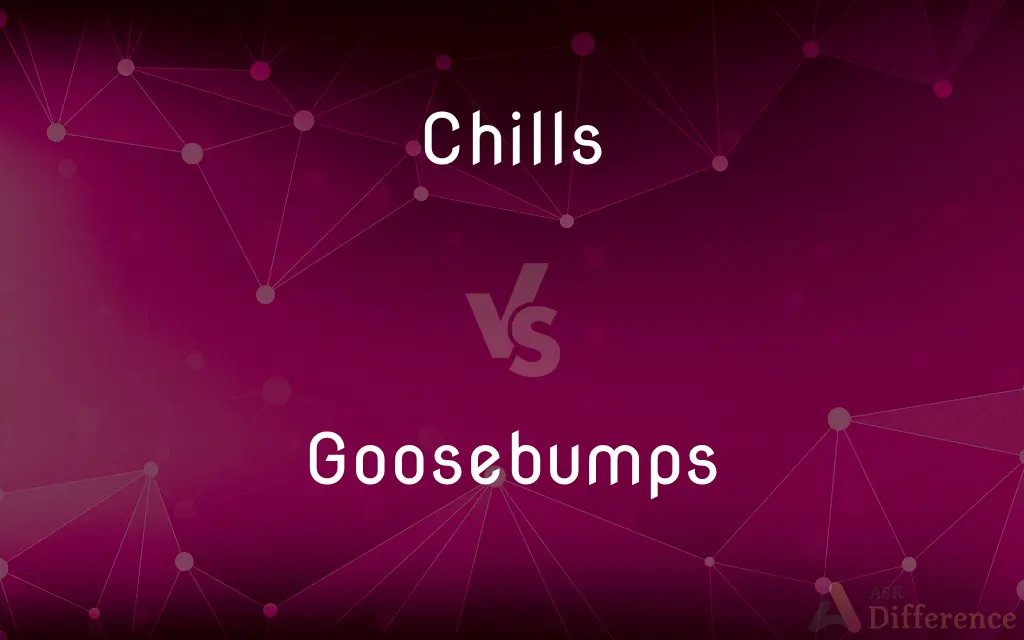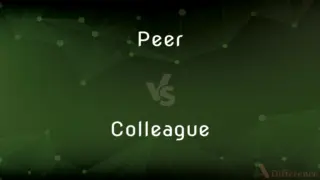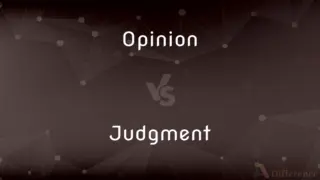Chills vs. Goosebumps — What's the Difference?
Edited by Tayyaba Rehman — By Maham Liaqat — Updated on April 20, 2024
Chills often signify a cold sensation or fear, causing muscle contractions, whereas goosebumps appear on the skin due to cold, fear, or emotions.

Difference Between Chills and Goosebumps
Table of Contents
ADVERTISEMENT
Key Differences
Chills are primarily a response to exposure to cold or emotional stress, involving involuntary muscle contractions that produce shivering. On the other hand, goosebumps occur when the tiny muscles at the base of hair follicles contract, causing the hair to stand erect, which can also be triggered by cold or emotional reactions.
Chills can be a symptom of various health conditions, such as fever or flu, reflecting the body's attempt to generate heat and regulate temperature. Conversely, goosebumps are more of a physiological reflex and are generally harmless, commonly associated with temporary feelings like fear or awe.
Chills often involve the whole body and are usually more intense and linked with feelings of being cold or ill. Whereas goosebumps are localized to the skin and can be seen as well as felt, often described as 'hair standing on end.'
The sensation of chills is typically described as uncomfortable and can be a distressing symptom of illness. In contrast, goosebumps may be linked to positive emotions as well, such as excitement or nostalgia, apart from fear and cold.
Chills tend to be associated with more severe bodily reactions and require attention if persistent, indicating a potential underlying health issue. Goosebumps, however, are short-lived and often related to changes in environment or emotional state, without indicating any health problem.
ADVERTISEMENT
Comparison Chart
Definition
Involuntary muscle contractions
Erection of hair due to muscle contraction at hair follicle bases
Common Causes
Cold, fever, fear, infection
Cold, fear, emotional responses
Duration
Variable, can be long if ill
Usually short-lived
Health Implications
Can indicate illness
Typically no health implications
Emotional Connection
Often negative (cold, fear)
Can be both positive and negative (fear, excitement)
Compare with Definitions
Chills
A feeling of coldness occurring during a high fever.
He got severe chills when his temperature rose last night.
Goosebumps
A physical reaction to cold, fear, or emotional stimuli.
She got goosebumps every time she heard that song.
Chills
The muscular contractions that cause shivering.
Chills racked his body as he walked in the snow.
Goosebumps
The condition where the skin appears bumpy due to erected hair follicles.
Goosebumps appeared on her arms as she watched the thriller.
Chills
An instance of shivering or shaking due to cold or fear.
The haunted house gave her chills.
Goosebumps
Associated with the reflex of piloerection.
The chilly wind caused goosebumps on his exposed neck.
Chills
Used to describe a situation that is frightening or eerie.
The story she told was full of chills.
Goosebumps
A sign of emotional arousal or excitement.
His performance left the audience with goosebumps.
Chills
A sudden scare that makes one feel cold or anxious.
The sound of footsteps in the dark gave him chills.
Goosebumps
Often used metaphorically to express a reaction to something deeply moving.
The powerful speech gave the crowd goosebumps.
Chills
Chills is a feeling of coldness occurring during a high fever, but sometimes is also a common symptom which occurs alone in specific people. It occurs during fever due to the release of cytokines and prostaglandins as part of the inflammatory response, which increases the set point for body temperature in the hypothalamus.
Goosebumps
Goosebumps is a series of children's horror fiction novels by American author R. L. Stine, published by Scholastic Publishing. The stories follow child characters, who find themselves in scary situations, usually involving monsters and other supernatural elements.
Chills
A moderate but penetrating coldness.
Goosebumps
Plural of goosebump
Chills
A sensation of coldness, often accompanied by shivering and pallor of the skin.
Chills
A checking or dampening of enthusiasm, spirit, or joy
Bad news that put a chill on the celebration.
Chills
A sudden numbing fear or dread.
Chills
Moderately cold; chilly
A chill wind.
Chills
Not warm and friendly; distant
A chill greeting.
Chills
Discouraging; dispiriting
“Chill penury repressed their noble rage” (Thomas Gray).
Chills
(Slang) Calm or relaxed
“As my meditation routine grew more stable...my already laid-back demeanor grew positively chill” (David Gelles).
Chills
To affect with or as if with cold.
Chills
To lower in temperature; cool.
Chills
To make discouraged; dispirit.
Chills
(Metallurgy) To harden (a metallic surface) by rapid cooling.
Chills
To be seized with cold.
Chills
To become cold or set
Jelly that chills quickly.
Chills
(Metallurgy) To become hard by rapid cooling.
Chills
To calm down or relax. Often used with out.
Chills
To pass time idly; loiter.
Chills
To spend time with someone in a relaxed manner; hang out together.
Chills
Plural of chill
Chills
(medicine) A feeling of being cold, a symptom of many conditions.
Common Curiosities
What emotions can cause goosebumps?
Fear, awe, excitement, and even pleasure can trigger goosebumps.
Are goosebumps a sign of illness?
No, goosebumps are not typically a sign of illness; they are a natural response to cold or emotional stimuli.
Do chills always mean you have a fever?
Not always, but chills are a common symptom of fever due to an infection.
Can everyone get chills and goosebumps?
Yes, chills and goosebumps are common physiological responses and most people experience them at some points.
What causes chills?
Chills are caused by rapid muscle contraction and relaxation to increase body heat, often due to cold or fever.
Do psychological factors affect chills?
Yes, psychological factors like fear and anxiety can trigger chills.
How long do goosebumps last?
Goosebumps are usually temporary and resolve once the stimulus (cold, fear, or emotion) is removed.
Are chills and goosebumps related?
Both are bodily responses to cold and emotional stress, but they involve different mechanisms.
What should I do if I get chills frequently?
Frequent chills should be evaluated by a doctor, especially if they're accompanied by other symptoms like fever.
Can chills be serious?
Chills can be serious if persistent and accompanied by fever, as they may indicate an underlying infection.
Why do some songs or movies give us goosebumps?
Emotional or aesthetic reactions to music or films can trigger the autonomic nervous system, causing goosebumps.
Is there a way to prevent chills?
Keeping warm and treating any underlying infections can help prevent chills.
Can temperature changes cause goosebumps and chills simultaneously?
Yes, exposure to a sudden drop in temperature can trigger both goosebumps and chills as the body reacts to maintain warmth.
Can animals get goosebumps?
Yes, many animals experience a similar piloerection reflex, often for thermoregulation or as a response to threats.
Are goosebumps the same as getting "the chills"?
No, "getting the chills" can refer to a sensation of cold or a fearful feeling, while goosebumps specifically describe the skin's reaction.
Share Your Discovery

Previous Comparison
Host vs. Hostage
Next Comparison
Department vs. ApartmentAuthor Spotlight
Written by
Maham LiaqatEdited by
Tayyaba RehmanTayyaba Rehman is a distinguished writer, currently serving as a primary contributor to askdifference.com. As a researcher in semantics and etymology, Tayyaba's passion for the complexity of languages and their distinctions has found a perfect home on the platform. Tayyaba delves into the intricacies of language, distinguishing between commonly confused words and phrases, thereby providing clarity for readers worldwide.
















































